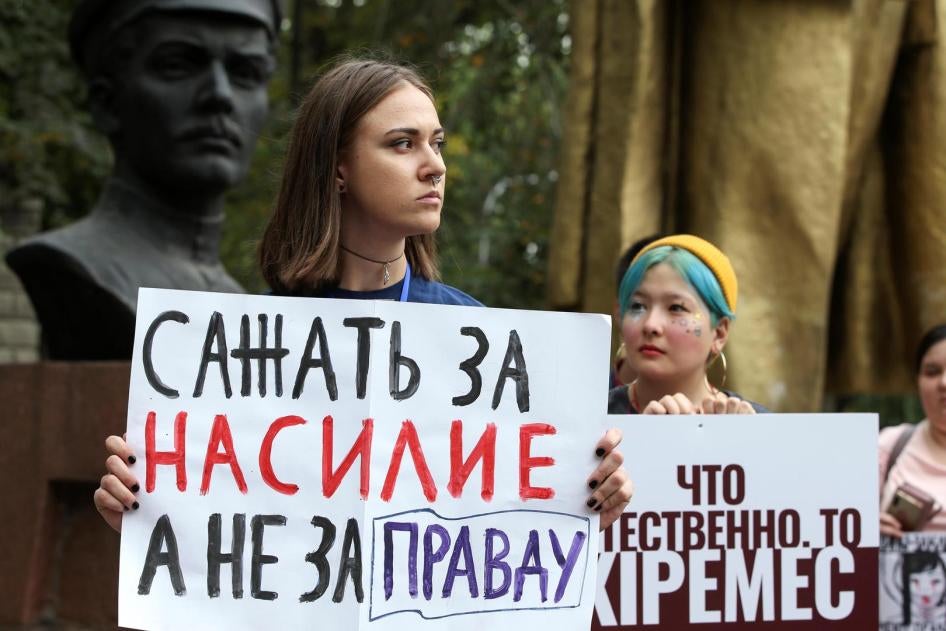(Berlin, March 7, 2023) – Kazakhstan should ensure that draft laws relating to domestic violence provide maximum protection for women from family violence, including by criminalizing domestic violence as a stand-alone offense, Human Rights Watch said today.
Two years after a previous draft law on domestic violence was withdrawn, two new draft laws currently under review offer crucial opportunities to remedy insufficient measures on domestic abuse.
“Kazakhstan’s existing laws basically leave domestic violence survivors to fend for themselves, and women have paid a high price for delays in law reform.” said Mihra Rittmann, senior Central Asia researcher at Human Rights Watch. “Lawmakers should urgently use this chance to ensure that new laws fully protect women from domestic violence.”
Domestic violence remains a serious human rights violation in Kazakhstan, with women representing the vast majority of victims. Over the past year, local media have reported on numerous cases of severe domestic violence across the country that resulted in the death of over 100 women since early 2022.
Under Kazakhstan’s current laws, including the 2009 law On Prevention of Domestic Violence, domestic violence is not a stand-alone criminal offense.
In September 2020, a draft law On Combating Domestic Violence, which would have strengthened protections for women survivors of family abuse, passed its first reading in parliament. However, in January 2021, it was withdrawn, with legislators saying that more consultations were needed.
Lawmakers have since proposed at least two other pieces of legislation that include domestic violence-related provisions. One is a draft law, initiated by parliament members to strengthen the institution of the family, that focuses on measures to prevent domestic violence. The second, from the Interior Ministry, would revise and amend the criminal and administrative codes provisions.
The Interior Ministry reported on February 13 that the Mazhilis, the lower chamber of Parliament, had approved its draft bill and that it is with the Senate, the upper chamber, for consideration. Among proposedamendments from the Interior Ministry are allegedly provisions to allow the imposition of administrative penalties, even if a domestic violence survivor does not pursue a complaint. Reportedly, the bill will also eliminate a reconciliation procedure in cases of a repeated act of family abuse and replace the current ‘warning’ sanction for aggressors with a requirement to complete specified public works.
The Interior Ministry’s draft law has not been made public, nor have lawmakers indicated that family violence is included as a stand-alone criminal offense in the draft.
The draft law on strengthening the institution of the family – that is currently available on the Mazhilis website – proposes amendments to a number of existing pieces of legislation, including the law On Prevention of Domestic Violence. The draft proposes further guidelines for coordination among various state agencies and outlines more comprehensive preventive measures. These include requiring the authorities to respond to media reports of domestic violence, including reports on social media. It would require greater domestic violence-related data monitoring and collection, and increase information and educational activities aimed at preventing domestic violence. However, it fails to establish domestic violence as a stand-alone offense.
Rights activists in Almaty and Astana told Human Rights Watch that they are aware the Interior Ministry was working on proposed amendments, but have not seen the draft law. And while some activists said they were able “to provide suggestions” for the draft law on strengthening the institution of the family, others said they did not take part in “the drafting process,” nor were they consulted.
The authorities should ensure that any draft bill concerning domestic violence issues are publicly available and take into account the input and recommendations of women’s rights and human rights experts, Human Rights Watch said.
President Kassym Jomart Tokayev has repeatedlyacknowledged the problem of family violence in Kazakhstan. He has said that tackling domestic abuse is an integral part of his reform agenda and has instructed relevant authorities to “tighten penalties” for domestic violence against women.
According to the Interior Ministry, police annually receive more than 100,000 domestic violence complaints. In the first 10 months of 2022, 93 women in Kazakhstan were killed in domestic violence-related homicides and 794 criminal cases were opened into moderate and severe bodily harm charges. Since the beginning of 2023, the police have already registered 18 killings due to family violence. Services for survivors, including shelters and crisis centers, remain severely limited, especially outside of urban areas.
In March 2021 the Interior Ministry doubled the number of female police officers in so-called special police units for the protection of women and children from violence and introduced investigator positions to be filled by women. In October 2022, Prime Minister Alikhan Smailov ordered responsible authorities “to take necessary measures to expand the network of crisis centers.”
But these steps are not enough. Anna Ryl, the head of the crisis center Korgau-Astana, run by a nongovernmental group in Astana, told Human Rights Watch that despite the government’s efforts, the situation with domestic violence “will not improve unless domestic violence is criminalized.”
Kazakhstan’s women’s rights lawyers and activists, including feminist’ groups, have called for the criminalization of family violence. They have also raised concerns over shortcomings in the current law on domestic violence.
Human Rights Watch has also repeatedly called for Kazakhstan to explicitly criminalize domestic violence and for greater accountability for abusers, as well as better support and protection for survivors, including in rural areas.
Kazakh authorities should ensure that any laws governing family affairs, and domestic violence in particular, include penalties for family violence that commensurate to the gravity of the violence.
Kazakhstan has an obligation, as a party to the UN Convention on the Elimination of All Forms of Discrimination Against Women (CEDAW), to work to eliminate violence against women, including domestic violence, by ensuring adequate protection, access to essential services for survivors, and accountability for abusers.
Kazakhstan’s partners should reiterate their calls for criminalization of domestic violence as a stand-alone offense and urge the authorities to ensure its laws and policies meet international standards, in particular the Council of Europe Convention on preventing and combating violence against women and domestic violence.
“Criminalizing domestic violence will send a clear message that abuse inside the home is intolerable and that women’s safety and well-being are paramount,” Rittmann said. “Lawmakers need to take decisive action to end impunity for acts of violence in the home.”









